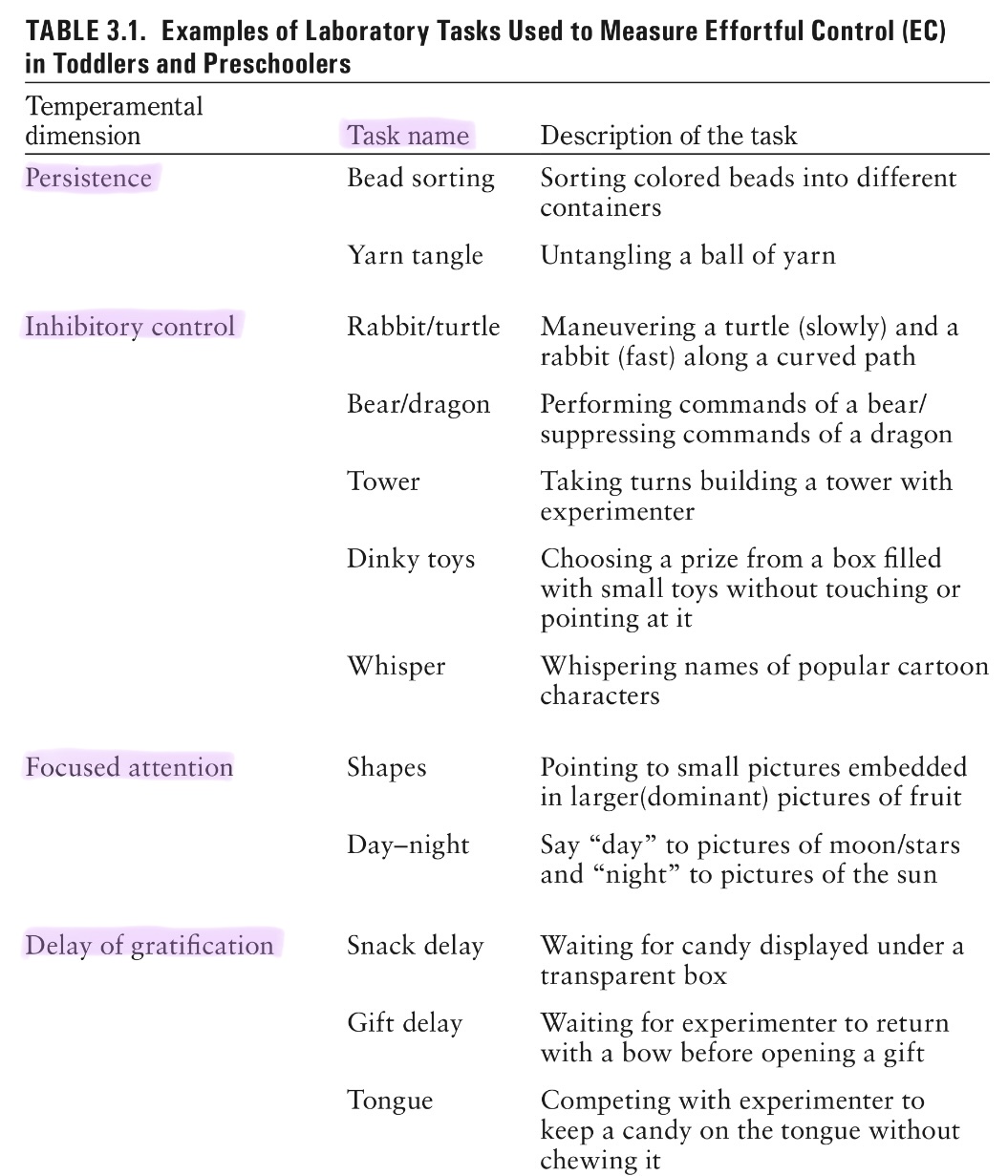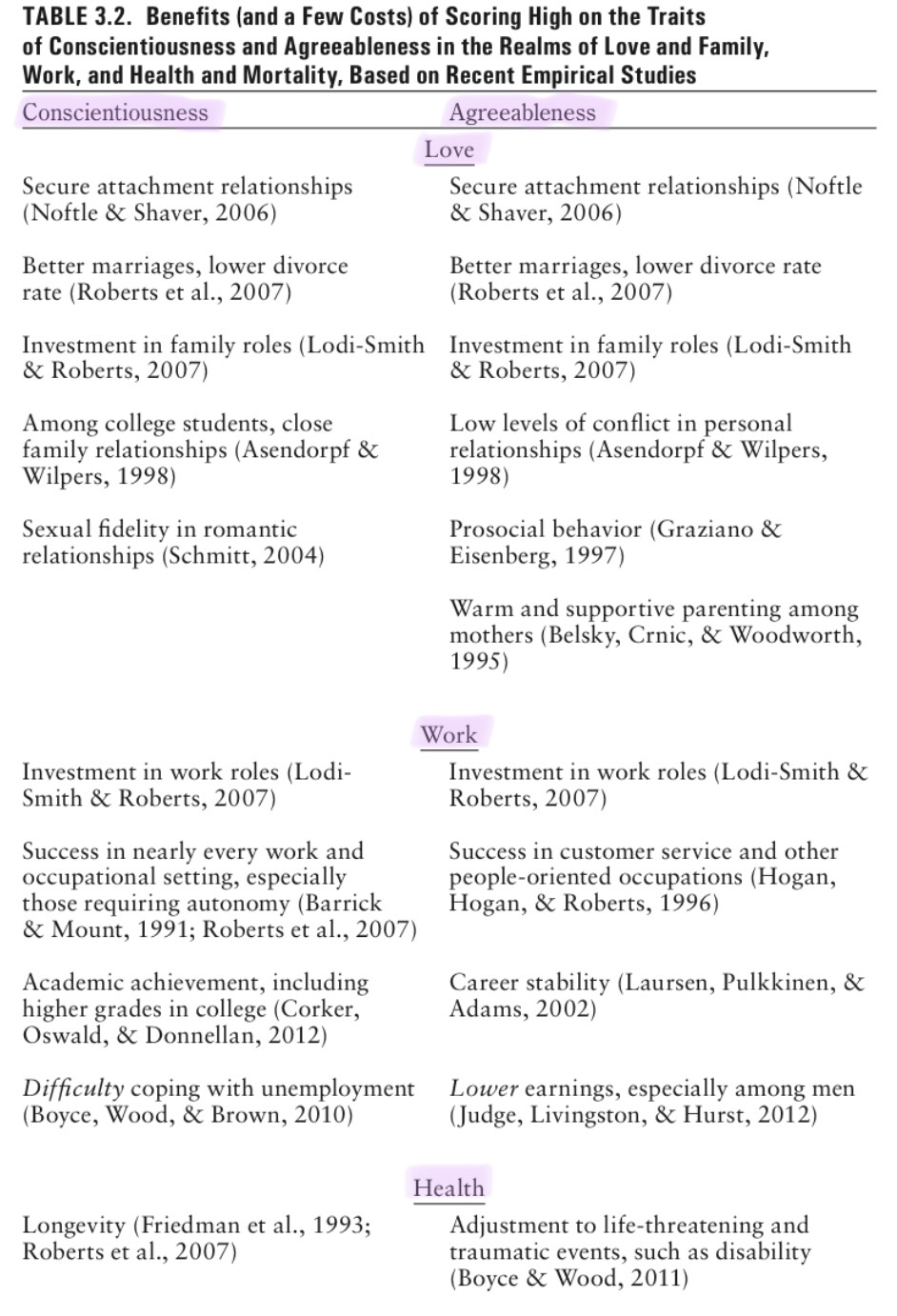Chapter 3 Textbook
Key Terms
- Antisocial behavior: acting in ways that directly threaten the health, well-being, and lives of other social actors in the group by using aggression most of the times
- Ego depletion: self-regulation becomes fatigued because an inner resource of self-regulatory energy has been used up
- Conscience: consists of rule-compatible conduct and moral emotions
- Serotonin: neurotransmitter implicated in the development of EC and self-regulation
- Sociopath: adult that expresses no empathy for other humans or no remorse for their antisocial behavior
- Self-regulation: 5 of the 7 deadly Christian sins involve a failure in this
- Emotions: give you advice on how things are going inside and outside by alerting you to opportunities for reward and by warning you of danger
- Effortful control (EC): effort exerted to control one’s impulses by developing a course of action to keep one focused on a long-term goal in the presence of a short-term distraction
- Empathy and guilt: key moral emotions for the development of conscience
- Executive attention network: network activated in situations in which a person needs to detect errors in the environment, cope with conflicting cognitive appraisals, overcome habitual or automatic response patterns or monitor their own behavior in the face of competing demands
- Prefrontal cortex and Anterior cingulate cortex: brain regions that help the executive attention network function
- High serotonergic function: being efficient and adaptive
- Low serotonergic function: being inefficient and maladaptive
- Primitive mode: outside of consciousness, impulsive, reactive, implicit, associative
- Secondary mode: conscious thought, rational decision making, deliberative, reflective, strategic, logical
- Conscientiousness (C): characteristics such as hardworking, self-disciplined, responsible, reliable, dutiful, well organized, persevering
- Agreeableness (A): characteristics such as love, empathy, friendliness, cooperation, care
- Ate: a kind of raging passion, pseudodemonic, that banished reason
- Self-regulation: controlling our feelings, impulses, and behaviors so that we maximize the chances of positive and minimize the chances of negative outcomes
- Self-regulation: depends on the observation of the actor by an audience, be that audience in the real world or in the actor’s mind
- Powerful social-moral emotions: embarrassment, shame, guilt, and pride
- Objective self-awareness: when the actor becomes explicitly aware of the self as an object of perception
- Self-regulation: acts as a muscle that becomes fatigued from overuse
- Regulation of emotions: involves making emotions more advisory than obligatory
- Effortful control (EC): provides a temperament foundation for the development of children’s conscience
- Prefrontal cortex: brain region implicated in planning complex social behavior
- Anterior cingulate cortex: brain region implicated in the mediation of reward-seeking behavior, control of empathy and other emotions, and governing conscious rational decisions
- Spindle cells: cells found only in humans and elephants that help to address difficult cognitive problems such as the detection of errors
- Prozac: drug developed to treat depression and that regulates one’s serotonin levels
- Authorities: routinely employ aggression or the threat of aggression for the purposes of social control
- Externalizing behaviors: when children and adolescents engage in aggressive activities and antisocial behaviors
Researchers - Theories
- Freud: believed that the solution to the problem of self-regulation is when 4-year-olds unconsciously renounce the sexual feelings they have for their parents
- George Herbert Mead: thinks that when children become aware of how the social world sees them, they will monitor behavior more closely and aim to act to meet the approval of the generalized other
- William James: believes that human conceptions of an omniscient God serve the same socializing purpose as do the social psychologists’ reflecting devices
Experiments
- Human beings act in more socially desirable ways when they know or believe that other human beings are watching them
- When people are positioned in front of mirrors, they work harder, are kinder and more altruistic, and comply more with social rules
- Seeing oneself reflected in a mirror induces a heightened feeling of objective self-awareness
- Japanese are less influenced by mirrors than Americans
- As people exert greater and greater efforts in self-control, they eventually break down, committing social errors and showing poor performance on subsequent tasks
- As people repeatedly attempt to self-regulate, they start to shift their attention toward rewarding cues and thoughts, making them more prone to disinhibited behavior
- Parents from individualist societies (Europe + North America) encourage high-arousal positive emotions in their babies such as joy/excitement but parents from collectivists societies (East Asia + Africa) encourage low-arousal positive emotions such as mild joy/calm/contentment/serenity
- Securely attached toddlers show healthier patterns of daily cortisol production suggesting better-regulated responses to stress
- Securely attached toddlers show better regulation of their emotions + behavior
- In the delayed gratification study with a marshmallow, children who waited to have 2 marshmallows used the strategy of distraction. Later in life, they also had more effortful control, fewer behavior problems, better friendships, and higher SAT scores
- Girls tend to show better EC than boys
- Children from economically deprived families have lower levels of EC
- Chinese and Korean preschoolers show better EC than North Americans
- People who tend to feel more guilt make fewer unethical business decisions, commit fewer delinquent behaviors and behave more honestly when making economic decisions
- High serotonergic function works to enhance the efficacy of the secondary system of processing
- Experimentally increasing serotonergic function reduces responsiveness to negative emotional stimuli, decreases aggression, and increases cooperativeness and social effectiveness
- Low serotonergic function among children is linked to ADHD
- Both high A and C are predictive of the quality of love relationships
- High C is correlated with high success at work
- High C predicts academic achievement in school
- People high in C tend to see their life satisfaction decrease even more in face of losing their jobs
- Men high in A tend to have lower income/pay
- High C and A is linked to being healthier and high levels of well-being
- Children who were high in C in their childhood lived longer
- People high in C are less likely to have accidents
- People low in C tend to have more unhealthy behaviors, which can lead to obesity and higher BMI
- People high in C tend to act in ways that avoid guilt
- Tendency to use aggressive force at 12 months of age is associated with the mother’s mood disorders during pregnancy and the mother’s own history of conduct problems
- Deficiencies in EC are associated with the development of aggressive and antisocial behavior
- Cold and rejecting parents who apply harsh discipline in an erratic fashion are most likely to raise aggressive children
- Boys from low socioeconomic status who were raised in adverse family environments are especially likely to join deviant peer groups as teenagers
Examples
- Mary from The Liar’s Club is both audience and actor, observing others and observing herself
- Mary’s mother: emotionally dysregulated, delusional
- Central theme of The Liar’s Club: self-regulation
- As a member of a eusocial species, the worst thing that can happen to you is being excluded from the group
- Social rejection triggers inflammation in the body detectable in blood cells and correspondingly compromises immune function
- McAdams got an “N” in practices self-control because teachers considered crying boys as deficient in the regulation of emotions
- Odysseus resisted the temptation of the Sirens by tying himself to the ship, demonstrating effortful control
- Phinneas Gage: his left frontal lobe was destroyed, resulting in an injury to self-regulation
- War can consolidate social bonds within the in-group as group members mobilize their resources to defeat a rival out-group
- Aggression may pose the greatest threat to a group’s well-being and even its survival
- Antisocial and criminal behavior peaks at around 17 years old
Table 3.1

Table 3.2

Summary
- Being able to regulate one’s emotions is the greatest problem that social actors face. It is an ability that is cultivated from early life experiences and is important in helping social agents attain status and acceptance within society as well as helping them control feelings, impulses, and behaviors to maximize the chances of positive and minimize the chances of negative outcomes.
- Self-regulation is influenced by social observation; even seeing oneself reflected in the mirror can have the same effect as being observed by others as it induces a heightened feeling of objective self-awareness.
- Cultural factors moderate the effect of objective self-awareness.
- Looking in the mirror can only work for a period of time; intense bouts of self-regulation can lead to ego depletion and subsequently, the engagement of disinhibited behavior.
- There are different factors (cultural background and attachment styles) that may have a strong impact on the development of emotion regulation.
- The concept of effort control is a dimension of temperament that involves the effort to control impulses and develop a course of action to focus on a long-term goal in the presence of an alluring short-term distraction. Effort control provides a temperament foundation for the development of conscience during the fourth and fifth years of life.
- Research suggests that the development of effort control and conscience in young children relies on the same neurocognitive system known as the executive attention network, which is a cerebral network that becomes active in situations in which a person needs to detect errors in the environment, cope with conflicting cognitive appraisals, overcome automatic response patterns, or monitor his or her own behavior in the face of competing demands.
- Effort control in childhood is probably the most important temperament precursor to two broad dispositional traits of adult personality – conscientiousness and agreeableness.
- The book also provides a summary table of the benefits and costs of being high on either trait.
- The chapter ends with a discussion on the development of aggressive tendencies and antisocial behaviors as a consequence of failed self-regulatory abilities.

